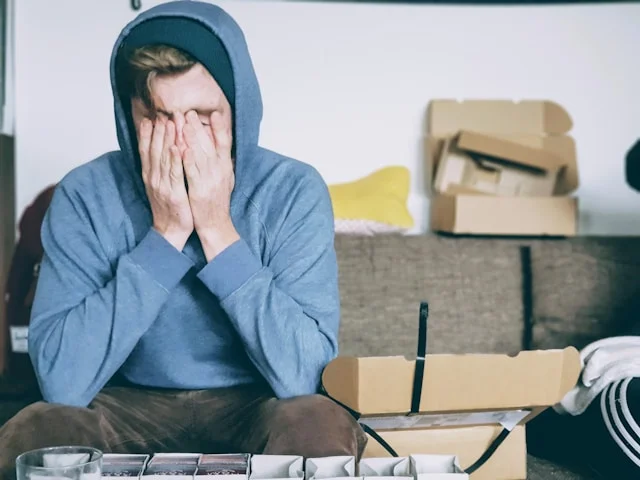I Just Want To Stay In Bed All Day, How Do I Change My Situation?
I’ve been there. I wake up in the morning, and the thought of getting out of bed feels impossible. Staying under the covers all day seems like the best option. You might be feeling the same way. It’s more than just being tired. It’s like a weight is holding you down, and it’s hard to see a way out. You’re not alone in this. Many people feel the same way at some point in their lives.
In this blog post, I’ll talk about why you might feel like staying in bed all day and how you can start changing your situation. I’ll break it down into simple steps and ideas. We’ll look at how your thoughts and feelings might be affecting you, and I’ll share some practical tips to help you get moving again.
Why Do I Feel Like Staying in Bed All Day?
Staying in bed all day might seem like the only option when you’re feeling low or overwhelmed. There are many reasons why this happens. Let’s look at some common ones:
1. Depression

Depression is more than just feeling sad. It can make you feel like you have no energy and no desire to do anything. Even simple tasks can feel like too much. If you’re depressed, staying in bed might feel like the only place where you can find some relief. But it’s important to recognize that depression is a medical condition. It’s not your fault, and you can get help.
2. Anxiety
Anxiety can make you feel overwhelmed by worry. You might be afraid of facing the day because you don’t know what will happen or you’re worried about something specific. This fear can make you want to avoid everything and just stay in bed where it feels safe.
3. Exhaustion
Sometimes, you might just be really tired. If you’re not getting enough sleep or you’re stressed out, your body and mind might be telling you to rest. It’s important to listen to your body, but it’s also important to find out why you’re so tired.
4. Lack of Motivation
When you don’t feel motivated, getting out of bed can seem pointless. Maybe you don’t have anything you’re excited about, or you don’t see the purpose in what you’re doing. This lack of direction can make you feel stuck.
5. Physical Health Issues
If you’re dealing with chronic pain or illness, staying in bed might seem like the best way to cope. Health problems can drain your energy and make it hard to do even simple activities.
6. Stress

Life can be really stressful. Work, family, money problems – all these things can add up and make you feel like you just want to hide away. Staying in bed can seem like a way to escape from all the pressure.
7. Burnout
Burnout happens when you’ve been under too much stress for too long. It can make you feel completely drained and unable to cope with anything. When you’re burned out, staying in bed might feel like the only option.
Understanding why you feel like staying in bed all day is the first step to changing your situation. Once you know what’s going on, you can start to take action to feel better.
How Do I Start Changing My Situation?
Changing your situation might feel like a huge task, but you can start with small steps. Here are some ideas to help you get moving again:
1. Set Small Goals
When you’re feeling low, big tasks can seem impossible. Start with small goals that are easy to achieve. This could be as simple as getting out of bed and brushing your teeth. Small successes can help you build momentum and make bigger tasks feel more manageable.
2. Create a Routine

Having a daily routine can give you a sense of structure and purpose. Try to go to bed and wake up at the same time every day. Plan some simple activities that you can do each day. This could be something like taking a walk, reading a book, or having a meal at a regular time.
3. Take Care of Your Body
Your physical health can have a big impact on how you feel. Make sure you’re eating healthy foods, drinking enough water, and getting some exercise. Even gentle activities like stretching or walking can make a big difference. Try to avoid things that can make you feel worse, like too much caffeine or sugar.
4. Talk to Someone
Sometimes, just talking to someone can help you feel better. Reach out to a friend or family member and let them know how you’re feeling. If you’re comfortable, you can also talk to a therapist or counselor. They can help you understand your feelings and find ways to cope.
5. Practice Self-Compassion
It’s easy to be hard on yourself when you’re feeling low. Try to be kind to yourself instead. Remember that it’s okay to feel the way you do, and it’s okay to take things one step at a time. Treat yourself with the same kindness and understanding that you would offer to a friend.
6. Find Something That Brings You Joy
Think about something you enjoy doing. It could be a hobby, a favorite show, or spending time with a pet. Try to make a little time for these activities, even if it’s just for a few minutes. Doing something you enjoy can help lift your spirits and give you a break from your worries.
7. Limit Social Media and News
Too much time on social media or watching the news can make you feel more anxious or depressed. Try to limit how much time you spend on these activities. Instead, focus on things that make you feel good or help you relax.
8. Practice Mindfulness or Meditation

Mindfulness and meditation can help you stay in the present moment and reduce stress. You don’t need any special equipment or training to get started. Just find a quiet place, sit comfortably, and focus on your breath. If your mind wanders, gently bring your focus back to your breathing.
9. Set Boundaries
If you’re feeling overwhelmed, it might be because you’re taking on too much. Learn to say no to things that you don’t have the energy for. It’s okay to set boundaries and take care of yourself.
How Can I Stay Out of Bed Once I’m Up?
Getting out of bed is a great start, but staying out of bed can be just as challenging. Here are some tips to help you stay up and active throughout the day:
1. Plan Your Day
Having a plan for your day can help you stay focused and motivated. Write down a list of things you want to do, even if they’re small tasks. Checking things off your list can give you a sense of accomplishment and keep you moving forward.
2. Find a Reason to Get Up
Think about something that gives you a reason to get up in the morning. This could be a project you’re working on, a person you want to see, or a goal you’re working towards. Having a purpose can make it easier to get out of bed and stay active.
3. Stay Connected
Reach out to friends or family members. Even a quick phone call or text message can help you feel more connected and less isolated. Social interactions can give you a boost of energy and make your day feel more meaningful.
4. Keep Your Space Bright and Clean

Your environment can have a big impact on how you feel. Try to keep your living space clean and bright. Open the curtains to let in natural light, and tidy up your room. A clean, well-lit space can help you feel more awake and positive.
5. Break Up Your Day
If staying up all day feels too hard, break your day into smaller chunks. Plan some short activities with breaks in between. This could be something like doing a quick exercise, reading a chapter of a book, or watching a short video. Breaking up your day can make it feel more manageable.
6. Get Outside
Spending time outside can boost your mood and energy levels. Even a short walk or sitting outside for a few minutes can make a big difference. Fresh air and sunlight can help you feel more awake and refreshed.
7. Reward Yourself
Give yourself something to look forward to. Plan a small reward for getting through your day. This could be a treat, watching a favorite show, or spending time on a hobby. Having a reward can give you extra motivation to stay active.
8. Stay Hydrated

Drinking enough water is important for your energy levels. Keep a bottle of water with you and take sips throughout the day. Staying hydrated can help you feel more awake and less sluggish.
9. Keep Moving
Try to keep moving throughout the day. Even small movements can help keep your energy up. Stretch, walk around, or do a quick exercise every hour or so. Keeping your body active can help you stay awake and focused.
10. Find a Routine That Works for You
Everyone is different, so find a routine that works best for you. Experiment with different activities and schedules until you find what helps you feel your best. It might take some time, but finding a routine that fits your needs can make a big difference.
Do People Sleep More When They Get Older?
You might wonder if staying in bed all day is just part of getting older. It’s true that sleep patterns can change as we age, but it doesn’t mean we need more sleep. Here’s a look at how sleep changes with age:
1. Sleep Needs Don’t Change Much
Most adults need about 7-9 hours of sleep per night. This doesn’t change much as we get older. However, older adults might have a harder time staying asleep or feel less refreshed after sleeping.
2. Changes in Sleep Patterns
As people age, they might experience changes in their sleep patterns. This can include going to bed earlier and waking up earlier, or waking up more often during the night. These changes are normal, but they can affect how rested you feel.
3. Health Conditions Can Affect Sleep
Older adults might have health conditions that make it harder to sleep well. This can include pain, medications, or conditions like sleep apnea. If you’re having trouble sleeping, it’s a good idea to talk to your doctor.
4. Sleep Quality Can Decrease
The quality of sleep can decrease with age. This means you might spend less time in the deep, restful stages of sleep. Even if you’re getting enough hours of sleep, you might not feel as rested.
5. Napping More Often
Older adults might nap more often during the day. This can be a way to make up for poor sleep at night. However, long naps can make it harder to sleep well at night, creating a cycle of poor sleep.
6. Staying Active Helps
Staying active during the day can help improve your sleep. Regular exercise and staying engaged in activities can help you feel more tired at night and improve the quality of your sleep.
7. Sleep Problems Are Common
It’s common for older adults to have sleep problems. If you’re having trouble sleeping, you’re not alone. There are many ways to improve your sleep, from lifestyle changes to treatments from your doctor.
8. Talk to Your Doctor
If you’re concerned about your sleep, talk to your doctor. They can help you understand what’s normal and what might need treatment. Don’t hesitate to ask for help if you’re struggling with sleep.
Conclusion
Feeling like you want to stay in bed all day is tough. It can be a sign that something is wrong, whether it’s stress, depression, or something else. But you don’t have to stay stuck. By understanding why you feel this way and taking small steps to change your situation, you can start to feel better.
Remember, it’s okay to ask for help. Talk to friends, family, or a professional if you need support. Be kind to yourself and take things one step at a time. Change won’t happen overnight, but with patience and effort, you can find your way out of bed and back into living your life.
If you’re feeling like this, know that you’re not alone. Many people have felt the same way and found ways to feel better. You can do it too. Take small steps, seek support, and give yourself time. You deserve to feel good and enjoy your life.
This blog post is a starting point. If you need more help or information, don’t hesitate to reach out to a professional. There are many resources available to support you on your journey to feeling better.
